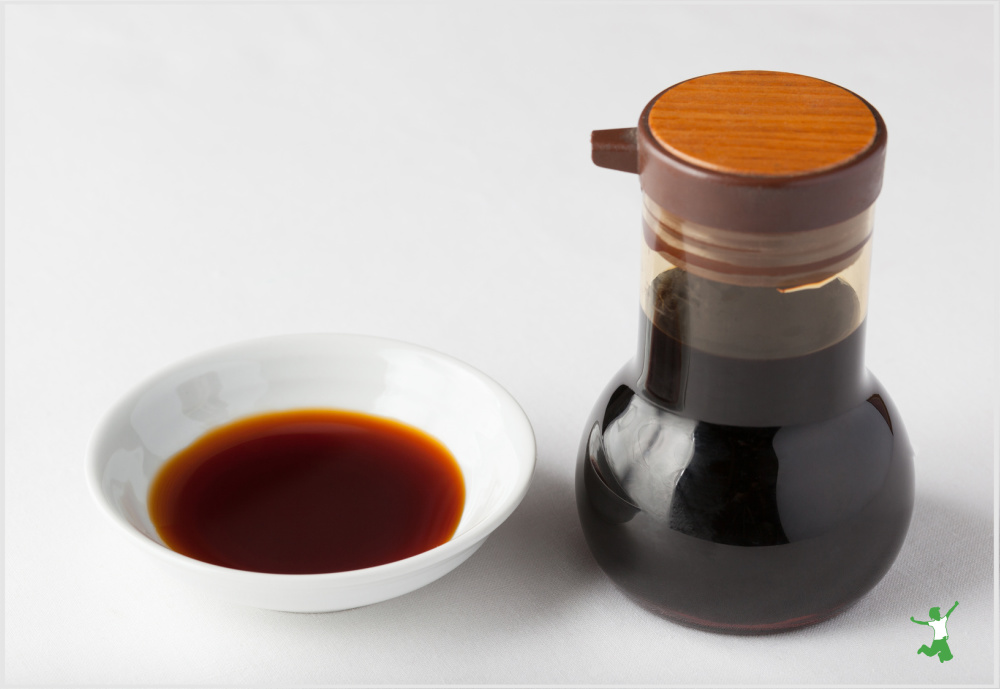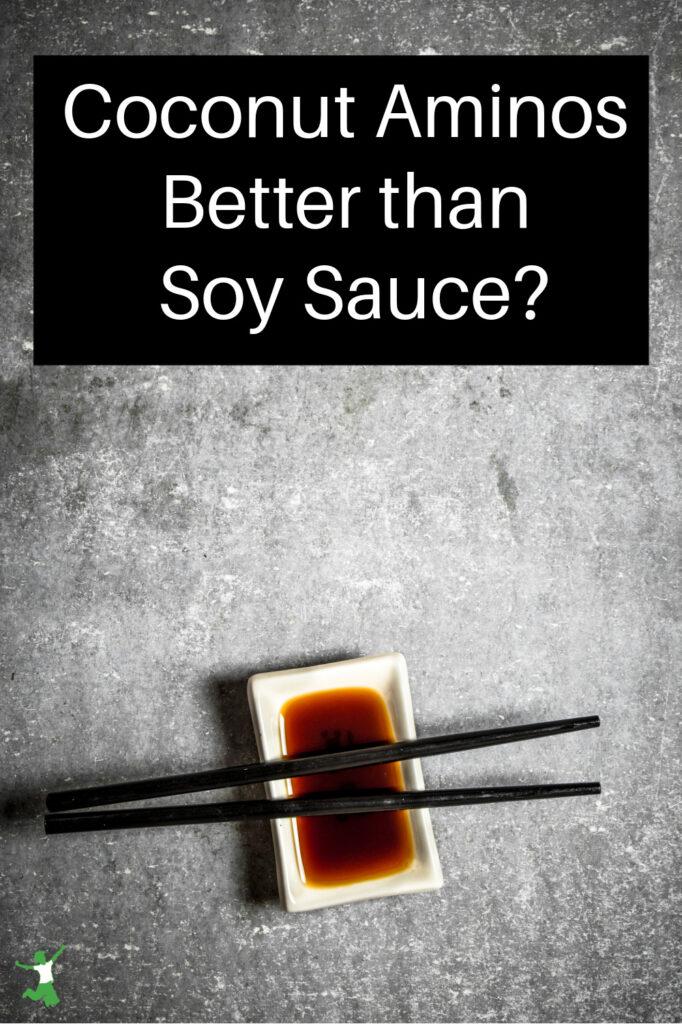Comparison of coconut aminos, soy sauce, and liquid aminos for nutrition, digestibility, and overall health benefits.

In recent years, health-conscious people from around the world have embraced all things coconut. Beyond plain coconut oil, products like coconut sugar, coconut flour, coconut cream, coconut milk, and coconut flakes are widely available.
For savory flavoring, coconut aminos have gained popularity as an allergy-free alternative to traditionally fermented soy sauce.
Coconut aminos is also a competitive product to Bragg’s regular Liquid Aminos.
Let’s take a look at these three food flavoring alternatives and see how each stacks up nutritionally and digestively.
How Coconut Aminos Are Made
The process of making aminos from coconut according to one of the most popular manufacturers is fairly simple.
It involves cutting coconut tree flowers to prevent the production of fruit and then tapping the tree to collect the flowing sap.
Vats of sap gradually ferment with additional salt with the final product transformed into coconut aminos.
What’s more, the product contains no additives or preservatives. It’s that simple.
Taste
Aminos from fermented coconut sap offers a nice balance of salty, a hint of sweet, and umami.
Surprisingly not any coconut flavor is detectable.
Even though produced via fermentation, coconut aminos from most producers are not raw although it used to be when it was brand new to the market.
Shelf stability has now taken precedence over offering the best product. This means that coconut aminos are typically pasteurized to meet mass production needs.
This process involves heating the coconut aminos to 165 degrees Fahrenheit for 30 seconds during bottling.
Next, the bottles containing the hot liquid are tipped upside down for one minute to sterilize the air space between the glass and the cap.
The good news is that this additional processing doesn’t affect the flavor, nutrition, or anything else about the product.
However, hot coconut aminos contacting the plastic cap for one minute is a bit questionable as a healthy manufacturing process in my view.
I would think that it leaches toxins from the plastic lid into the product itself, although I have no hard data to back up this hunch.
Coconut Aminos versus Soy Sauce
There are a number of reasons someone may prefer coconut aminos over soy sauce.
NonGMO
First, GMO soy is the source for most soy sauces in North America unless organic or nonGMO certified.
As a result, those who consume it risk the GMO health dangers associated with it…especially those related to Roundup residues.
Also, a lot of soy sauces contain all sorts of questionable ingredients beyond just the conventional soybeans. This includes additives, preservatives, and stabilizers.
By comparison, coconut aminos are just coconut aminos.
Products with ingredient lists that are short, clear, and unambiguous as to the contents are preferable to those that are not.
Low Allergen
Second, some people are allergic to soy but still want to enjoy dishes that require the flavors that soy sauce creates.
Coconut aminos are a great option for such individuals and such dishes.
While some people are allergic to coconut, a much larger number of people have an allergy to soy.
Gluten-free
Most traditional soy sauces contain gluten (wheat), so coconut aminos offers an easy gluten-free option.
Although gluten-free soy sauce options are now available, the fact that coconut aminos is both soy and grain-free makes this choice appealing to those on certain types of restrictive diets.
Lower Sodium
Finally, coconut aminos contain less salt than soy sauce. Roughly two-thirds less in fact, which is significant!
For people who need to watch or reduce sodium intake, coconut aminos are a great option.
Gut Healing Diets
While there are a number of reasons coconut aminos may appeal over soy sauce, those on gut-healing diets might need to steer clear.
Both the GAPS diet and the Specific Carbohydrate Diet disallow coconut sugar and coconut syrup due to the difficult-to-digest disaccharides in the coconut sap.
Coconut aminos are made from the very same sap.
Thus, unfermented brands of coconut aminos (such as Bragg’s) would definitely be a no-go.
However, for brands of fermented coconut aminos (such as Coconut Secret), the disaccharides in the sap may be broken down enough to be tolerated.
For those on Full Gaps (not Intro), properly fermented wheat-free soy sauce is allowed. (1-2)
Avoid Liquid Aminos (always)
While coconut aminos and soy sauce have their pros and cons, liquid aminos have no redeeming health benefits and are to be avoided all the time.
According to Dr. Kaayla Daniel:
Liquid aminos are an unfermented liquid soy product invented by health food pioneer Paul Bragg and is a soy sauce alternative preferred by many health aficionados. Its main claim to fame has been a lower sodium content than tamari or shoyu.
As a hydrolyzed [nonGMO soy] protein, liquid aminos contain plenty of MSG produced as a residue of the hydrolyzing process. It also contains aspartic acid, another brain damaging excitotoxin, which is a component of aspartame as well.
The takeaway: No bragging rights for liquid aminos!
Synthetic MSG vs Natural Glutamate
Both soy sauce and coconut aminos (if fermented) contain natural glutamate derived from the fermentation process.
By comparison, liquid aminos contain MSG derived from the industrialized process of hydrolyzing soy protein.
Hence, the glutamate in fermented coconut aminos is safer and likely better tolerated than the manufactured MSG in liquid aminos.
For those susceptible even to the small amounts of glutamate or histamines in fermented foods, brands of unfermented coconut aminos are a better choice (except for those on GAPS!).
Health Benefits
Some websites attribute a wide and large array of health benefits to coconut amino consumption. The problem is…these studies that support such claims used whole coconuts, coconut oil, or other coconut products, not the aminos!
Hence, beware of conflated health claims floating around about coconut aminos specifically.
Coconut aminos contain no medium-chain triglycerides (MCTs) one of the most beneficial macronutrients in coconuts.
In fact, they contain no fat at all.
As a result, it seems highly unlikely that many of the positive benefits of coconuts and coconut oil apply to coconut aminos.
This doesn’t mean that the product is without health benefits. It just means that it would be highly improper to attribute the positive results in certain studies for coconut oil and other coconut products as applicable to coconut aminos!
In addition, a person would typically use a rather small amount of coconut aminos for any given dish.
Thus, given the very small amount consumed in a day or even a week, the impact on health is probably negligible.
Enzymes and Probiotics
Some organic and traditionally brewed soy sauces are unpasteurized (this is the brand I’ve used for years), which is an edge nutritionally if you are using it for dipping at the table with sushi and related dishes.
But, some dishes that use soy sauce are cooked after it is added.
In that case, using enzyme and probiotic-rich unpasteurized soy sauce isn’t any better than coconut aminos.
Sustainability
Coconut oil is a sustainable product when farmers manage the groves according to green, environmentally friendly practices.
But the plethora of new coconut products flooding the market, especially coconut sugar and sap (and thus also the aminos), some say may not be. (3)
Investigate your preferred brand of coconut aminos and its pledge of sustainability. Here’s what Coconut Secret says about its product:
The most remarkable blessing about tapping a coconut tree, is that once tapped, it flows its sap continuously for the next 20 years. From a sustainability viewpoint, the harvestable energy production from tapping coconut trees for their sap (which yields 5,000 liters per hectare), rather than allowing them to produce fruit, is 5-7 times higher per hectare than coconut oil production from mature coconuts. (4)
If you prefer soy sauce, be sure that it is always organic and/or nonGMO certified (this is the brand I’ve used for years).
Summary
There is no reason not to enjoy both coconut aminos and high-quality traditionally brewed soy sauce.
Always skip the regular liquid aminos, however!
It is especially important to avoid restaurant (GMO) soy sauces with additives and use your own traditionally brewed brand from home for takeout meals.
Coconut aminos have a similar but slightly different flavor profile than soy sauce allowing an easy change-up for the same dish.
However, don’t expect it to be the perfect replacement for all dishes especially if you are on a gut-healing diet.
For those with allergies or other soy-related issues, coconut aminos provide an acceptable alternative and one that you can feel good about consuming.

(1) GAPS FAQ
(2) Full GAPS Legal Fried Rice
(3) Coconut Palm Sugar Sustainability
(4) Coconut Secret: Our Social Impact







I’m not allergic to soy, but obviously I want to avoid gmo soy. Is the Ohsawa organic nama shoyu a good soy sauce for creating Asian inspired sauces to put over chicken and veggies? Or should it only be used raw. If it’s not really cooked long or at a high heat would it be okay?
Thanks for your help
It’s fine if you cook with it, but you will lose all the enzymes and probiotics from its raw state.
Surprised you didn’t mention the fact that fermented sauces like soy sauce and coconut aminos will all contain some mycotoxins. They’re a class I carcinogen and among the most toxic substances on earth, so even a small amount will do some harm over time. What’s worse, the glutamate in unfermented Bragg’s liquid aminos or the mycotoxins in the fermented stuff? Not claiming to know the answer to that, but my immune system reacts with inflammation to mycotoxins so I have to avoid them.
If Bragg’s liquid amino’s are creating artificial MSG by means of hydrolyzing the soybeans to extract the amino acids, and their coconut amino’s are not made through traditional fermenting, what makes you think they are not hyrolyzing the coconut to make the coconut aminos, thus also resulting in artificial MSG??
The difference is that coconut has little to no protein in it to hydrolyze! MSG comes from denaturing glutamate, one of the amino acids in protein. No protein, no MSG.
MSG is a problem. I have a friend who gets very ill from the smallest amount. It also can damage the brain, esp. in children. The unnatural form that is put in many foods is not something I want to consume.
I’m a bit surprised here: Are you saying that high sodium is not a problem?
For who?
Patients with congestive heart failure?
GMO or MSG can not be a problem with the small amounts consumed,